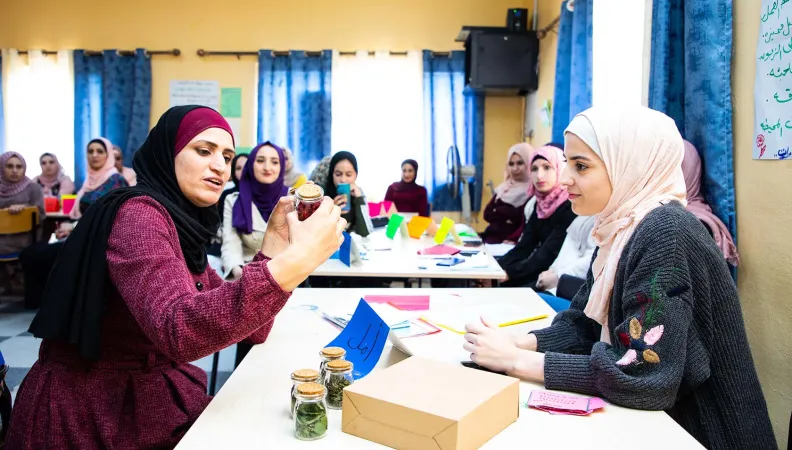Share the page
Improving Livelihoods and Maximizing Economic Empowerment (ILHAMEE)
Project


-
Project start date
-
Status
Ongoing
-
Project duration
-
5 years
-
AFD financing amount
-
€ 5 000 000
-
Country and region
-
Location
-
Jordanie
-
Type of financing
-
Beneficiaries
-
Jordan Education for Employment (EfE -Jordan)
With ILHAMEE (“my inspiration” in Arabic), the goal is to create economic opportunities by providing mentoring, training and financial services to Jordanians and Syrian refugees, mainly women, thereby contributing to a more inclusive and sustainable development.
Context
The Covid-19 pandemic has affected Jordan’s economy and its capacity to provide for the most vulnerable segments of its population. Poverty is on the rise, while the unemployment rate has doubled since 2008, averaging 24 % in 2022. Approximately 29 % of young Jordanians are neither in employment, education or training, so are 44 % of women. Jordan hosts 1,3M of Syrian refugees, whose situation in terms of poverty and employment is dire, and whose integration into the labor market is a challenge.
Thus, the lack of job creation and the lack of income-generating opportunities for young people are two of the most pressing socio-economic problems facing Jordan, especially for vulnerable women and young people. Not to mention the frequent mismatch between the training offer and the skills required by employers.
Description
The purpose of the project is to create economic opportunities in Jordan by offering support, targeted training and financial services to Jordanians and Syrian refugees, mainly women, thus contributing to social cohesion and inclusive socio-economic development.
The two specific objectives are :
- the generation of income and the integration of women through the acquisition of skills and knowledge through various forms of training and support (training in the digital sector and other relevant sectors, support for micro-entrepreneurship)
- the development of more inclusive practices in the workplace and vocational training. The latter will entail capacity-building activities with the project stakeholders. A gender action plan will be implemented across the board.
Impacts
Over a period of five years, the project will directly benefit 2,000 Jordanians and Syrian refugees, at least 60 % of whom are women and 30 % Syrians. The project will implement approaches adapted to the different target audiences (vulnerable people including Syrian refugees, Jordanian and Syrian women) and will develop spaces for dialogue between the beneficiaries, communities, institutions and the private sector, thus helping to reduce social tensions between refugees and Jordanians.
The project will contribute to the empowerment of women, the reduction of their vulnerability and better inclusion in the labor market.


